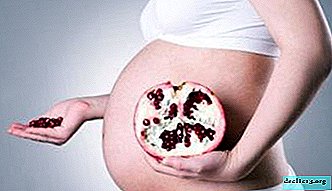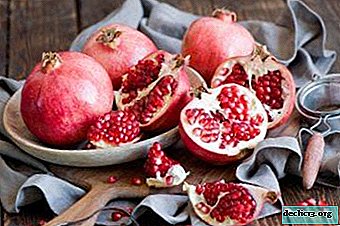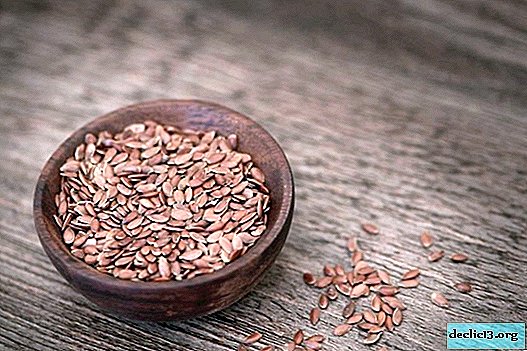Is it possible to eat pomegranate during pregnancy? Useful properties, contraindications and step by step recipes

Any expectant mother takes care of her baby. Therefore, one of the issues relevant to her is: "What is good for me and my child?"
Pomegranate, recognized as a real storehouse of useful substances, is absolutely indispensable in the diet of a pregnant woman. Benefit or harm is the use of pomegranate during pregnancy and whether it is possible to eat in the early stages, we will tell further.
Can I eat during pregnancy?
It is possible or not pregnant grenades, try to figure it out. Pregnancy is the period when a woman especially needs a balanced diet, saturated with all vitamins and minerals. Her body works for two, and she just needs pomegranate as a source of all important nutrients. Its benefit for the expectant mother is obvious, thanks to the unique chemical composition, it also has a beneficial effect on the baby developing in the womb. therefore pregnant women need to eat pomegranate, but you need to know the measure.
Harm
During pregnancy, the woman’s body is extremely sensitive, and if in the usual state excessive eating of pomegranate can pass without a trace, then when bearing a child it can fail in the form of, for example, an allergic reaction.
Consumption restrictions
 Pomegranate affects the entire digestive system and the stomach in particular. Due to the large number of acids in its composition, it is able to cause the expectant mother to increase the level of acidity and, as a result, heartburn. Many pregnant women suffer from this problem, especially in the later stages.
Pomegranate affects the entire digestive system and the stomach in particular. Due to the large number of acids in its composition, it is able to cause the expectant mother to increase the level of acidity and, as a result, heartburn. Many pregnant women suffer from this problem, especially in the later stages.- The body of a pregnant woman works in an enhanced mode, spending her own reserves of strength on the formation of the fetus. So, the calcium needed to build a child’s bone tissue often comes from the mother’s body. As a result, thinning of the enamel of the pregnant woman. Pomegranate also negatively affects the condition of the teeth, which in the end result can lead the woman in labor to their loss.
Reference! Doctors recommend pomegranate juice to prevent tooth problems only through a tube, and before eating the fruit itself, eat a piece of cheese or brush your teeth with toothpaste. After the treats, it is necessary to rinse the mouth with water or a special elixir.
- With caution, the fruit should be eaten by those women in a position who are prone to low blood pressure. It is this effect that this fetus has on the body, or rather, the bones contained in the grains. Mom hypotonic better to drink juice.
Contraindications
The following is a list of those diseases in which the use of pomegranate in food can harm a pregnant woman and her baby.
- Allergy to exotic fruits.
- Gastric ulcer or gastritis with high acidity.
- Hemorrhoids, anal fissures.
- Constipation
- Kidney problems.
If any adverse reactions occur in the body of a pregnant woman that are not characteristic of a woman in a normal state, it is imperative to consult a doctor.
How much can I eat?
 A granular apple to a pregnant woman can be eaten every day for any period, but no more than ½ part of a medium-sized fetus, which will be approximately 100 - 150 g. In no case should you eat more than the established norm, as if this would not be desirable.
A granular apple to a pregnant woman can be eaten every day for any period, but no more than ½ part of a medium-sized fetus, which will be approximately 100 - 150 g. In no case should you eat more than the established norm, as if this would not be desirable.
To prevent possible problems with the stomach, it is recommended to use pomegranate or its juice only 30 minutes after the main meal.
Are bones useful?
Now let's see if it is possible to eat pomegranate with seeds. Very often you can come across the opinion of different people who claim that pomegranate seeds are harmful. You should calm down about this: for all people, and at the same time for expectant mothers, eating pomegranate seeds is not contraindicated. But you need to remember: pomegranate seeds contribute to lowering blood pressure, they will be useful only to mothers suffering from hypertension. They also have a highly astringent property that will help with diarrhea.
What is useful during pregnancy?
The chemical composition of pomegranate is truly unique. It contains:
- proteins;
- amino acids;
- fiber;
- carbohydrates;
- fats
- vitamins (A, C, group B, E, PP);
- minerals (potassium, calcium, iron, magnesium, phosphorus, copper, etc.).
The pomegranate pulp contains anthocyanins, leukoanthocyanins, catechins, phytoncides, which act as antioxidants in the human body.
Fruit has a beneficial effect on the digestive tract:
- improves appetite;
- helps with bloating and in the fight against attacks of nausea with toxicosis.
Its action is of a general strengthening character and strengthens the immune system of the expectant mother. Pomegranate has a diuretic effect, while being an absolutely natural product.
 A granular apple has a beneficial effect on hematopoietic function in the body, increasing the level of hemoglobin in the blood, which is very important for the expected birth loss of a woman. It also perfectly strengthens blood vessels, which has a beneficial effect on the state of the heart muscle.
A granular apple has a beneficial effect on hematopoietic function in the body, increasing the level of hemoglobin in the blood, which is very important for the expected birth loss of a woman. It also perfectly strengthens blood vessels, which has a beneficial effect on the state of the heart muscle.
Pomegranate promotes the production of oxytocin - a hormone that helps in delivery. It contains a large amount of folic acid, which is involved in the formation of the baby's nerve cells.
Fruit is an excellent antiseptic. He can easily cope with the beginning sore throat of the future mother, especially since in such a delicate position the use of tablets is contraindicated.
Low-calorie pomegranate (60 kcal per 100 g), it can be safely included in the diet for those pregnant who suffer from weight gain. Also, the royal fruit perfectly tones the muscles, has a beneficial effect on the skin, making it supple and elastic, and also effectively fights pigment spots that spoil the mood of many expectant mothers.
Attention! The opinion that garnet is a source of iron is erroneous. This substance is indeed found in the fruit, but in small doses. In addition, plant origin does not contribute to the absorption of iron by the human body.Indications for use
- Toxicosis during the first trimester (in the early stages) of pregnancy.
- Swelling.
- High blood pressure.
- Anemia.
- Diarrhea.
- Cough.
- Angina.
- Prevention of stretch marks, age spots.
What to cook?
Now about how to eat pomegranate during pregnancy. The food of the pregnant woman should be as useful as possible for her and her baby. The recipes below are an example of a balanced diet and will also be useful for expectant mothers who suffer from weight gain.
Vitamin salad with Peking cabbage

Prepare everything you need:
- Chinese cabbage - 300g;
- pomegranate - ½ part;
- chicken or quail eggs - 2 (4) pcs .;
- yogurt - 80 ml;
- greenery;
- salt.
- Wash cabbage, greens, boil eggs.
- Peel pomegranate, remove grain from it.
- Finely chop the cabbage, finely chop the greens.
- Chop the eggs with a medium dice.
- In a container, mix cabbage, greens, eggs, pomegranate seeds, add a little salt.
- Pour with natural yogurt.
Cooking Vitamin Salad
Oranges with pomegranate seeds in a thick sauce

Prepare all products:
- 250 ml of orange juice;
- 2 pieces of oranges;
- 1 PC. grenade;
- 50 g of sugar;
- 2 tbsp starch;
- vanillin.
- Bring orange juice with vanilla and sugar to a boil.
- Pour starch into a boiling juice previously diluted in a small amount of water. Boil a little.
- Peel and cut the orange slices, extract pomegranate seeds.
- Spread a layer of oranges, pomegranate seeds on a plate, pour the sauce over everything, repeat everything again.
- Allow the dish to cool so that the sauce thickens.
Oatmeal with cottage cheese and pomegranate juice

To prepare the dish you will need:
- oat flakes - 300 g;
- pomegranate juice - 300 ml;
- cottage cheese - 300 g;
- pomegranate - 1 pc.;
- almonds - 40 g.
- Pour oatmeal with pomegranate juice.
- Simmer until cooked.
- Mix porridge with cottage cheese and pomegranate seeds.
- Transfer the mixture to a plate, top with crushed almond nuts.
The benefits of pomegranate during pregnancy are undeniable. But we should not forget: all that is useful is that in moderation. Do not abuse any food during pregnancy, pomegranate is no exception. In any case, all adverse reactions should be immediately reported to the doctor who is monitoring.

 Pomegranate affects the entire digestive system and the stomach in particular. Due to the large number of acids in its composition, it is able to cause the expectant mother to increase the level of acidity and, as a result, heartburn. Many pregnant women suffer from this problem, especially in the later stages.
Pomegranate affects the entire digestive system and the stomach in particular. Due to the large number of acids in its composition, it is able to cause the expectant mother to increase the level of acidity and, as a result, heartburn. Many pregnant women suffer from this problem, especially in the later stages.















